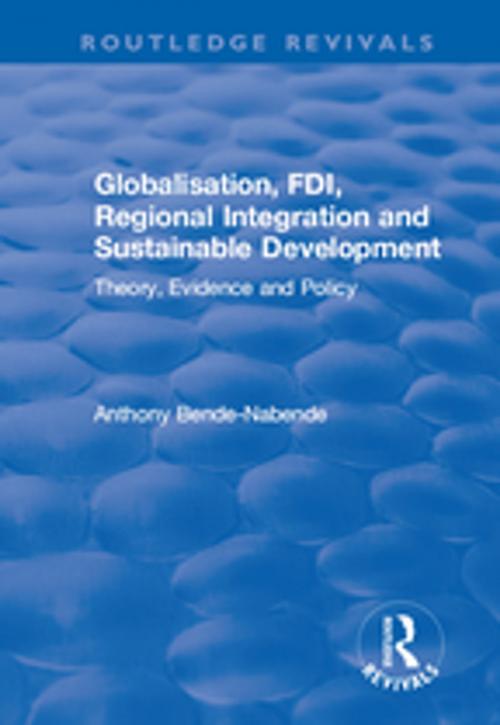Globalisation, FDI, Regional Integration and Sustainable Development
Theory, Evidence and Policy
Nonfiction, Social & Cultural Studies, Political Science| Author: | Anthony Bende-Nabende | ISBN: | 9781351783903 |
| Publisher: | Taylor and Francis | Publication: | October 5, 2017 |
| Imprint: | Routledge | Language: | English |
| Author: | Anthony Bende-Nabende |
| ISBN: | 9781351783903 |
| Publisher: | Taylor and Francis |
| Publication: | October 5, 2017 |
| Imprint: | Routledge |
| Language: | English |
This title was first published in 2002: Anthony Bende-Nabende focuses on the ongoing globalization process, which has sparked an unprecedented world-wide debate. He provides a one-stop centre for a balanced coverage of the theoretical, empirical and policy issues linking globalization with foreign direct investment, regional economic integration, and economic growth and sustainable development. This stimulating book comprehensively explores the theoretical and empirical literature inter-linking the aforementioned factors from the anti-globalization activists’ viewpoint, and from the pro-globalization proponents’ perspective. It proposes policies that individual countries should pursue, based on the recognition that globalization generates both positive and negative effects. These comprise policies required to maximise the economic benefits globalization may generate, and those that aim to eliminate or at least minimize the negative development-oriented effects globalization may engender and, hence, to propel sustainable development. The book will be an essential guide for students, academics and those involved in international economics, environmental studies, international relations, and growth and development studies.
This title was first published in 2002: Anthony Bende-Nabende focuses on the ongoing globalization process, which has sparked an unprecedented world-wide debate. He provides a one-stop centre for a balanced coverage of the theoretical, empirical and policy issues linking globalization with foreign direct investment, regional economic integration, and economic growth and sustainable development. This stimulating book comprehensively explores the theoretical and empirical literature inter-linking the aforementioned factors from the anti-globalization activists’ viewpoint, and from the pro-globalization proponents’ perspective. It proposes policies that individual countries should pursue, based on the recognition that globalization generates both positive and negative effects. These comprise policies required to maximise the economic benefits globalization may generate, and those that aim to eliminate or at least minimize the negative development-oriented effects globalization may engender and, hence, to propel sustainable development. The book will be an essential guide for students, academics and those involved in international economics, environmental studies, international relations, and growth and development studies.















